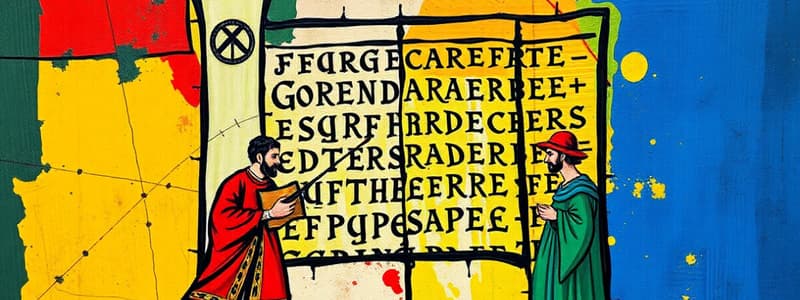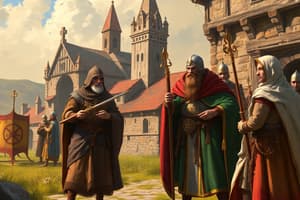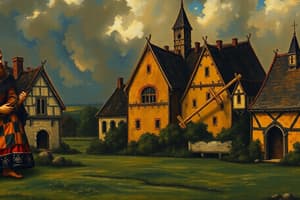Podcast
Questions and Answers
What political ideology did the king adhere to?
What political ideology did the king adhere to?
- Liberal Democracy
- Republicanism
- Constitutional Monarchy
- Divine Right of Kings (correct)
What was the main source of conflict during the king's reign?
What was the main source of conflict during the king's reign?
- Trade disputes with foreign powers
- Disagreements with the nobility
- Growing conflict with Parliament (correct)
- Religious persecution of Protestants
What was the Gunpowder Plot?
What was the Gunpowder Plot?
- A trade agreement with Spain
- A rebellion led by the nobility
- A plot to blow up the Houses of Parliament (correct)
- A conspiracy to assassinate the Queen
Who were the primary conspirators in the Gunpowder Plot?
Who were the primary conspirators in the Gunpowder Plot?
Which building was the target of the Gunpowder Plot?
Which building was the target of the Gunpowder Plot?
What document directly preceded the Petition of Right?
What document directly preceded the Petition of Right?
What is the main focus of the Petition of Right?
What is the main focus of the Petition of Right?
Who signed the Petition of Right?
Who signed the Petition of Right?
Which event occurred in 1919?
Which event occurred in 1919?
What was the primary consequence of Charles I’s failure to abide by the Petition of Right?
What was the primary consequence of Charles I’s failure to abide by the Petition of Right?
Which of these best describes Charles I’s adherence to the Petition of Right after signing it?
Which of these best describes Charles I’s adherence to the Petition of Right after signing it?
What was a significant achievement for women in 1919?
What was a significant achievement for women in 1919?
Which international agreement was established in 1919?
Which international agreement was established in 1919?
What international organization was founded in 1919?
What international organization was founded in 1919?
What was NOT a major event that took place during 1919?
What was NOT a major event that took place during 1919?
What was the primary aim of Germany's bombing campaign during the Battle of Britain?
What was the primary aim of Germany's bombing campaign during the Battle of Britain?
Which event was a direct result of Germany's aerial attacks on London?
Which event was a direct result of Germany's aerial attacks on London?
What was a significant social impact of the war effort during this period?
What was a significant social impact of the war effort during this period?
What specific measure was introduced to manage the distribution of limited resources during the war?
What specific measure was introduced to manage the distribution of limited resources during the war?
What was the main purpose of the Battle of Britain?
What was the main purpose of the Battle of Britain?
What was established by the Single European Act of 1986?
What was established by the Single European Act of 1986?
Which event occurred in 1990, according to the text?
Which event occurred in 1990, according to the text?
Why did Britain withdraw from the EMS?
Why did Britain withdraw from the EMS?
What was the purpose of the European Monetary System (EMS)?
What was the purpose of the European Monetary System (EMS)?
How long was the UK part of the EMS?
How long was the UK part of the EMS?
In what year was the European Convention on Human Rights adopted by the UK?
In what year was the European Convention on Human Rights adopted by the UK?
What is the primary function of the European Court of Human Rights with respect to the UK?
What is the primary function of the European Court of Human Rights with respect to the UK?
What is the main legal document that allows the European Court of Human Rights to overrule UK court decisions?
What is the main legal document that allows the European Court of Human Rights to overrule UK court decisions?
Prior to 2000 which of the following had the final say on legal matters in the UK?
Prior to 2000 which of the following had the final say on legal matters in the UK?
What specific kind of court is the 'European Court of Human Rights'?
What specific kind of court is the 'European Court of Human Rights'?
Flashcards
Divine Right of Kings
Divine Right of Kings
The belief that a king's power comes directly from God, not from the people.
Parliament
Parliament
The English Parliament, a body of representatives elected by the people, was responsible for making laws and approving taxes.
Gunpowder Plot
Gunpowder Plot
A plot by a group of Catholics to assassinate King James I by blowing up the Houses of Parliament.
What was the Gunpowder Plot?
What was the Gunpowder Plot?
Signup and view all the flashcards
Why was there the Gunpowder Plot?
Why was there the Gunpowder Plot?
Signup and view all the flashcards
Petition of Right
Petition of Right
Signup and view all the flashcards
English Civil War
English Civil War
Signup and view all the flashcards
Charles I's Disregard for the Petition of Right
Charles I's Disregard for the Petition of Right
Signup and view all the flashcards
Rights Protected by the Petition of Right
Rights Protected by the Petition of Right
Signup and view all the flashcards
Impact of the Petition of Right
Impact of the Petition of Right
Signup and view all the flashcards
Battle of Britain
Battle of Britain
Signup and view all the flashcards
The Blitz
The Blitz
Signup and view all the flashcards
Rationing
Rationing
Signup and view all the flashcards
Women Working in Industry
Women Working in Industry
Signup and view all the flashcards
Spirit of Solidarity
Spirit of Solidarity
Signup and view all the flashcards
Irish Republican Army (IRA)
Irish Republican Army (IRA)
Signup and view all the flashcards
Women's suffrage
Women's suffrage
Signup and view all the flashcards
Treaty of Versailles
Treaty of Versailles
Signup and view all the flashcards
League of Nations
League of Nations
Signup and view all the flashcards
Punishments for Germany in the Treaty of Versailles
Punishments for Germany in the Treaty of Versailles
Signup and view all the flashcards
What was the Single European Act?
What was the Single European Act?
Signup and view all the flashcards
What was the EMS?
What was the EMS?
Signup and view all the flashcards
Why did Britain leave the EMS?
Why did Britain leave the EMS?
Signup and view all the flashcards
What was the EEC?
What was the EEC?
Signup and view all the flashcards
What are tariffs?
What are tariffs?
Signup and view all the flashcards
European Convention of Human Rights Adoption in UK
European Convention of Human Rights Adoption in UK
Signup and view all the flashcards
Power of the European Court of Human Rights
Power of the European Court of Human Rights
Signup and view all the flashcards
European Convention of Human Rights
European Convention of Human Rights
Signup and view all the flashcards
Significance of the European Convention of Human Rights in the UK
Significance of the European Convention of Human Rights in the UK
Signup and view all the flashcards
When was the European Convention of Human Rights adopted in the UK?
When was the European Convention of Human Rights adopted in the UK?
Signup and view all the flashcards
Study Notes
The Normans
- 1066: Harold defeated a Scandinavian invasion in the north, but was defeated by William the Conqueror at the Battle of Hastings. William became King of England.
- 1086: The Domesday Book recorded all land and property in England. William established a feudal system where barons received land from the king and granted some to knights.
- 1100: Henry I united Saxons and Normans, ruling a kingdom stretching from France (Normandy) to Northern England.
- 1100-1170: Henry II expanded the kingdom, strengthening central government. He reorganized courts, creating common law. French became the language of courts.
- 1170: Thomas Becket, Archbishop of Canterbury, challenged the king's authority over the church and was murdered.
- 1215: King John signed the Magna Carta, limiting royal power.
- 1284: Wales joined the kingdom.
- 1295: Edward I convened a "Model Parliament", a two chambered assembly, with the House of Lords representing nobility and clergy and the House of Commons representing towns and counties.
- 1305: Scotland revolted under Robert the Bruce, achieving independence.
Hundred Years' War and the Wars of the Roses
- 1337-1453: The Hundred Years' War between England and France for control of France. England initially held territories, but France regained its lands by 1453.
- 1348: The Black Death (plague) devastated England.
- 1381: Peasant revolt against taxation in England.
- 1455-1485: The Wars of the Roses, a struggle for the English throne between the House of York and the House of Lancaster. Henry Tudor (House of Lancaster) united England in 1485.
- 1476: William Caxton established England's first printing press, printing books in English.
The Reformation and Reign of Elizabeth I
- 1534: Act of Supremacy. King Henry VIII broke with the Pope and declared himself the Supreme Head of the English Church.
- 1558-1603: Reign of Elizabeth I. Catholicism was banned, but there was a period of relative religious stability.
- 1587: Mary, Queen of Scots, was executed.
- 1588: Spanish Armada was defeated.
The Stuart Period
- 1603: James VI of Scotland became James I of England.
- 1605: The Gunpowder Plot: Catholics tried to blow up the Houses of Parliament.
- 1611: King James's Bible was published.
- 1625-1649: Charles I's reign was marked by conflict with Parliament..
- 1628: Petition of Right: Charles I was forced to sign, limiting royal power, including no taxes without Parliament's consent.
- 1642-1648: Civil War between Parliamentarians and Royalists.
- 1649: Charles I was executed and the monarchy was abolished.
- 1660: Restoration of the monarchy with Charles II
- 1665: The Great Plague in London
- 1666: The Great Fire of London
- 1672-1673: Creation of the Royal African Company and the Test Act
- 1685: James II became king.
- 1688: Glorious Revolution: James II was removed from power (overturned the divine right of kings)
- 1689: Bill of Rights: Established a parliamentary democracy and limited the power of the monarch.
- 1701: Act of Settlement: prevents Catholics from inheriting the throne.
- 1707: Act of Union: Creates Great Britain from England and Scotland.
The 18th and 19th Centuries
- 1714: Hanoverian Dynasty began with George I.
- 1764: The Spinning Jenny was invented.
- 1785: Steam engine invented by Watt
- 1776: American Colonies declared independence
- 1801: Act of Union: Creates the United Kingdom of Great Britain and Ireland.
- 1805: Lord Nelson defeats the combined French and Spanish fleets at Trafalgar
- 1807: Abolition of the slave trade
- 1815: Battle of Waterloo ends the Napoleonic Wars
- 1829: Catholics were granted freedom of worship.
- 1832: First Reform Act extended voting rights to the middle class.
- 1837-1901: Victorian Era: marked by empire expansion.
- 1867-1884: More extensions of voting rights
- 1870, 1872, 1876: Education Act, Ballot act, Queen Victoria becomes Empress of India.
- 1884: Vote for unskilled workers
- 1899-1902: Boer War in South Africa (a struggle over land)
The 20th and 21st Centuries
- 1900: Creation of the Labour Party.
- 1902, 1908, 1911: Education, Old Age Pension, and Parliament Acts.
- 1913: Cat and Mouse Act
- 1914-1918: World War I.
- 1916: Easter Rising in Ireland
- 1918: Nationalists win Irish elections
- 1919: Creation of Irish Republic
- 1926: General Strike
- 1928: Representation of the People Act (women get the vote in Britain)
- 1929: Start of the Great Depression
- 1936: Edward VIII abdication crisis
- 1939: Britain declared war on Germany
- 1940-1945: World War II: Battle of Britain, Blitz, allied forces land in France
- 1942: Beveridge Report
- 1944-1947-1949: Creation of the welfare state and decolonization ends WWII
- 1949: UK joins NATO
- 1951-1964: Conservative Governments
- 1956: UK involvement in the Suez Crisis
- 1969-1997: Beginning of the Troubles
- 1973: UK joins EEC
- 1979: Margaret Thatcher becomes PM
- 1982: Falklands War
- 1984: Miners' Strike
- 1986-1990: Single European Act
- 1999: Hong Kong returns to Chinese control
- 1997-2000: Labour-led Government focuses on domestic policy issues
- 2000: UK ratified the European Convention on Human Rights
- 2003-2004: UK sends troops to Iraq
- 2005: Tony Blair re-elected
- 2007-now: Events from 2007-Present (Tony Blair departs, Credit Crunch, Global Financial Crisis, rise of extremist ideologies, continued UK engagement in international conflicts, etc. )
- 2016: Brexit referendum
- 2017-2023: UK withdrawal from EU, political issues and events
Studying That Suits You
Use AI to generate personalized quizzes and flashcards to suit your learning preferences.



